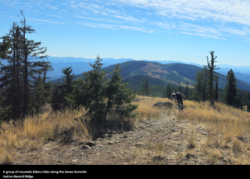ROSSLAND, B.C. — The Save Record Ridge Action Committee (SRRAC) has filed a petition for judicial review in B.C. Supreme Court, challenging an Environmental Assessment Office (EAO) decision not to require an environmental assessment (EA) for the proposed Record Ridge magnesium mine.
“We are asking the Supreme Court to send this decision back to the EAO, directing it to reach an outcome that will safeguard public health, our environment and our economy, and align with the EAO’s legal and constitutional obligations," said Elissa Ferguson, spokesperson for SRRAC.
The Record Ridge mine is proposed by West High Yield (W.H.Y.) Resources Ltd., a Calgary-based junior mining company. If built, it would be the company’s first operating mine. The project would be just seven kilometres from the resort municipality of Rossland, making it the closest open-pit mineral mine to any municipality in B.C., and even closer to the smaller communities of Paterson and Big Sheep Creek.
The company initially applied to extract 200,000 tonnes of ore per year, but in 2024 the EAO ruled that the project required an EA at that production capacity. The company then resubmitted an amended application only weeks later, declaring a production capacity of 63,500 tonnes per year - just below the 75,000-tonne threshold for an EA - but leaving the project’s design, footprint, and infrastructure practically unchanged. Even the Ministry of Mining and Critical Minerals admitted that the company’s 2024 re-application was “essentially the same” as the original proposal.
SRRAC is now challenging the EAO’s decision, arguing that the EAO acted unreasonably in accepting the company’s revised figure at face value. The group points to expert evidence showing the company’s own plans demonstrate the mine has a much greater production capacity, well above the legal threshold for an EA. They also cite several examples in the company’s public materials referring to production well above the threshold.
“This is a fundamental test of whether environmental regulations in B.C. are applied appropriately,” said Ferguson. “The EAO cannot simply accept numbers declared by a proponent at face value while ignoring the reality of a project’s scale. This sets a dangerous precedent — one that could risk public health and the environment in communities across B.C. It undermines protections for projects of all kinds, far beyond mining. If a proponent’s declared production capacity is not subject to regulatory scrutiny, thresholds for environmental assessment become meaningless.”
SRRAC’s judicial review petition also argues that the EAO failed to meaningfully consider evidence of the project’s potential adverse effects, including risks to human health from asbestos and other contaminants that are present in the ore, water quality, wildlife habitat, Indigenous rights and interests, and cross-border impacts. These risks are especially acute given the mine’s location within an imperiled grassland and Old Growth Management Area, which provides habitat for the federally red-listed Mountain Holly Fern. The site is also home to the renowned Seven Summits Trail, B.C.’s first International Mountain Biking Association Epic-rated trail, which is recognized globally.
SRRAC’s legal counsel, Ben Isitt, says the case is about whether resource development in B.C. proceeds in accordance with the rule of law: “The law requires an environmental assessment for mineral mines of the scale proposed by WHY Resources. In disregarding the evidentiary record, including expert evidence, the EAO breached its duty to safeguard the public interest in environmental protection. SRRAC is now pursuing a remedy in the B.C. Supreme Court to correct this error and safeguard the environment and human health in the Rossland area.”
SRRAC notes that the EAO’s decision on Record Ridge is inconsistent with the B.C. government’s stated commitment to “world-class” oversight of mining and other resource projects. In pursuing this judicial review, SRRAC seeks to ensure that legal and regulatory safeguards for communities and the environment are upheld — maintaining public trust in B.C.’s oversight of mining and resource development.
For further information, contact
Elissa Ferguson, spokesperson, Save Record Ridge Action Committee, saverecordridge@gmail.com
